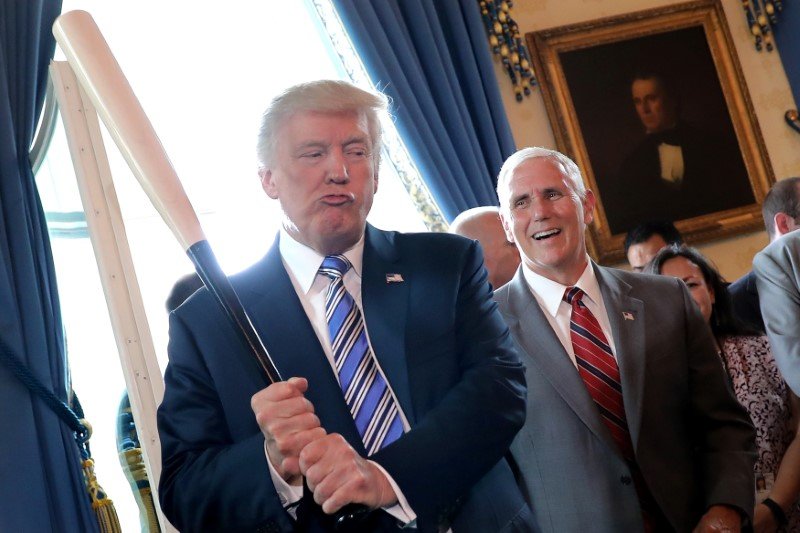 Vice President Mike Pence laughs as President Donald Trump holds a baseball bat at the Made in America product showcase event at the White House.Thomson Reuters
Vice President Mike Pence laughs as President Donald Trump holds a baseball bat at the Made in America product showcase event at the White House.Thomson Reuters
President Donald Trump has promised “swift and strong economic actions” against Venezuela if it goes through with the July 30 vote to form a constituent assembly that President Nicolas Maduro has called for.
The assembly would be able to rewrite the constitution and augment Maduro’s powers, and the Venezuelan president’s effort to convene it has been widely rejected at home and abroad.
A senior Trump administration official declined to detail specific options under consideration or to name specific persons who could be targeted, but the official indicated there was broad range of potential responses.
“The president told us to consider all options, so all options are on the table,” said the official, speaking on a conference call with reporters. “All options are being discussed and debated, and we can promise that whatever actions we choose to take after July 30 will be, again, strong, swift, and deliberate.”
When asked whether that included sanctions on Venezuela’s oil sector, the official again said “all options are on the table,” indicating that the White House is still considering a major escalation in US pressure on Venezuela. The official did not rule out taking action against the Maduro government prior to July 30.
 Opposition supporters rally against President Nicolas Maduro’s government in Caracas, Venezuela, October 26, 2016.Thomson Reuters
Opposition supporters rally against President Nicolas Maduro’s government in Caracas, Venezuela, October 26, 2016.Thomson Reuters
Senior administration officials told Reuters in early June that the US could target Venezuela’s state oil company, Pdvsa, as part of “sectoral” sanctions that would go after the country’s energy industry.Potential actions include a blanket ban on Venezuelan oil imports and blocking Pdvsa from dealings in the US.
While Trump has imposed sanctions on Venezuelan officials and may target more them, he has so far refrained from actions that could hurt Venezuelans in general or that would give credence to the government’s accusations of interference. But the country’s deepening crisis may have prompted Trump to give the South American country more attention than his predecessor.
Going after Venezuela’s oil sector is generally considered the most drastic action the US could take against the OPEC member. Venezuela sits on the world’s largest oil reserves, and oil accounts for some 95% of the country’s export revenue.
Such sanctions would likely reverberate throughout Venezuela, as any reduction in government revenue would limit imports, on which the country relies heavily for food and medicine. The availability of both is already severely limited.
Targeting oil would also cut into state revenues and hinder Caracas’ ability to pay bondholders.
 A worker pumps gas into a vehicle at a gas station belonging to Venezuela’s state oil company, PDVSA, in Caracas, February 12, 2016.Thomson Reuters
A worker pumps gas into a vehicle at a gas station belonging to Venezuela’s state oil company, PDVSA, in Caracas, February 12, 2016.Thomson Reuters
“It would increase the likelihood that they would default,” Dany Bahar, a fellow at the Brookings Institution, told the Financial Times. “If they default it is going to make it much harder for them to stay in power.”
It would also be felt in the US energy sector.
Citgo, the US-based refiner and supplier owned by Pdvsa, has about 6,000 stations in the US, employing 46,000 people.
 An oil tank at PDVSA’s Jose Antonio Anzoategui industrial complex in Anzoategui state, April 15, 2015.REUTERS/Carlos Garcia Rawlins
An oil tank at PDVSA’s Jose Antonio Anzoategui industrial complex in Anzoategui state, April 15, 2015.REUTERS/Carlos Garcia Rawlins
Through April this year, the US imported about 720,000 barrels of Venezuelan oil a day.
Venezuela is the US’s third-largest oil supplier, behind Canada and Saudi Arabia, and supplied 8% of US oil imports in March.
That fuel would be hard to replace, as it is heavier than petroleum produced by most US oil fields. (Venezuelan oil production has declined significantly in recent years, as the sector deals with chronic underinvestment and mismanagement as well as the collapse of global oil prices.)
The administration official told reporters on Tuesday that the White House was cognizant of the potential repercussions in the US from measures under consideration.
“We of course are mindful of the importance of any impact that it would have on the American people, American jobs, American economy, and we’ll only make tough decisions if we are forced to for national-security or foreign-policy reasons,” the official said.
“But rest assured that we have all of the information at our disposal as far as impact analyses and different scenarios, and again we’ll do our best to try to avoid, of course, a negative impact on the United States as much as possible, but we also will not shy away from having impacts as needed if it’s in our national-security interest.”













